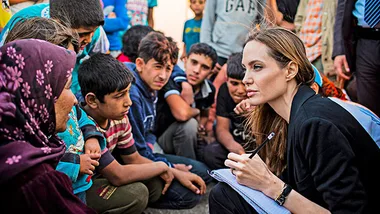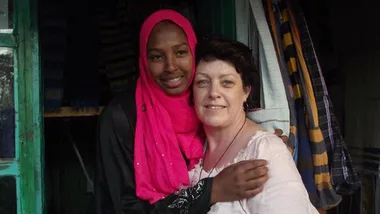When you think about Australia sending asylum seekers to Nauru, it’s very easy to get swept up in the politics, fear and mud-slinging.
But what this issue boils down to is essentially a group of human beings, who arrived here on the wrong type of transport at the wrong time.
And aside from having left their homelands, they’re not that different from you and I.
That realisation struck me abruptly while I was talking to an asylum seeker for a feature on Nauru, published in the March issue of The Australian Women’s Weekly, which is out today.
Let’s call this asylum seeker Diane (she didn’t want me to use her real name for fear of jeopardising her case).
Diane is the same age as me. She has a daughter who is the same age as my son. Just like me, she had a career she loved, a home, a car and juggled work and family.
As for differences, Diane is more educated than me: she has two degrees. She’s smarter than me. She speaks more languages. Her job with a large international company was more senior.
If it weren’t for the lottery of birthplace, Diane could be living in my shoes. Or I could be in hers.
But it was her life that veered sickeningly off course. Death threats, the disappearance of a family member and the near abduction of her daughter in broad daylight made life too dangerous to stay in her country.
So she fled, got on a boat with her daughter (“no mother wants to put their children on a boat – it was the last option,” she explains) and ended up in Australia.
Fast-forward a year and she was on Nauru with her daughter, wondering whether it would have been better if they’d both drowned at sea. Diane says she was sexually assaulted while seeking medical attention in Nauru, while her daughter became ill and traumatized from witnessing self-harm.
The temptation – particularly in politics – is to stereotype all asylum seekers as potential terrorists, economic migrants or, conversely, helpless victims who do no wrong.
The truth, of course, is that it’s more complicated than that. Some are good people who’ve fled war, violence and persecution, want to contribute to society and raise their families in peace. Some may simply be seeking a better life. And there may also be criminals among them who should not be allowed to enter Australia.
This is why each person is vetted before they’re granted refugee status. Many asylum seekers have been returned to their countries.
How this issue should be resolved is a tricky question to answer.
The Government is adamant offshore processing in Nauru and Manus Island is the only way to prevent people smugglers from sending more boats (we haven’t had any asylum seekers arrive by boat in 18 months).
Critics disagree, arguing that keeping people in limbo in Nauru under allegedly unsafe conditions is too high a price to pay. Particularly for babies, children and women.
Nauru is a long way from anywhere, which makes it difficult to scrutinise but easy to forget.
Whatever your view, we should not forget these asylum seekers are human beings. Just like you and I.
Read Clair Weaver’s investigation into the “Island of the Damned” Nauru in the March issue of The Australian Women’s Weekly.




